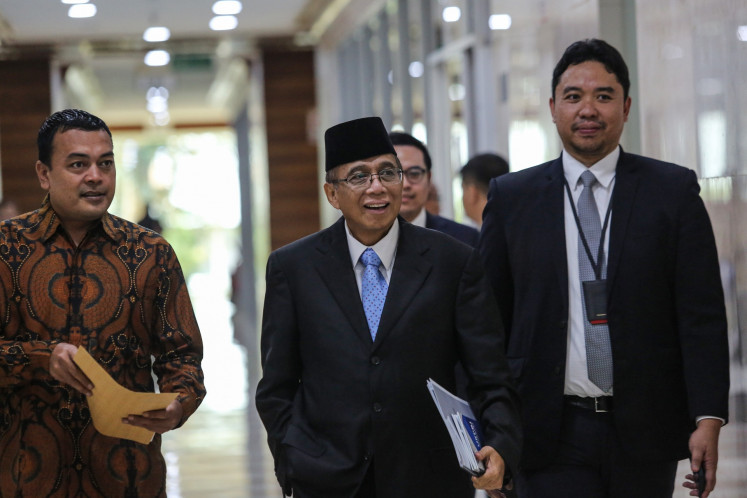Popular Reads
Top Results
Can't find what you're looking for?
View all search resultsPopular Reads
Top Results
Can't find what you're looking for?
View all search results'Alex', the consummate diplomat
From a newsroom proofreader, he rose to become Indonesia's top envoy, and emerged as one of the world's finest diplomats
Change text size
Gift Premium Articles
to Anyone
From a newsroom proofreader, he rose to become Indonesia's top envoy, and emerged as one of the world's finest diplomats. He bore decades of ridicule for the nation, only to be left betrayed by one man's folly.
He was a man who often professed a longing to retire, but was never allowed respite even in his golden years.
Never one to tolerate mediocrity, he spared no breath for details as they would be perceived, whether it be on a young diplomat or novice reporter.
He was the Houdini of negotiations, the great conciliator, but above all he was a good man who was sometimes too good for his own sake.
He was an eloquent speaker who never revealed his own passions.
Ali Alatas attends the 25th Anniversary reception of The Jakarta Post in April 2008. Also present were Trade Minister Mari Pangestu and Jusuf Wanandi, a founder of the newspaper. (JP/J. Adiguna)
To a nation left with a debt of honor, he was Pak Ali Alatas; to the people who knew him, he was affectionately known simply as Alex.
Much more than what he was, Alatas was as enigmatic as he was simple.
Volumes would not suffice to explain his deeds and virtues; yet through no fault of his own, his legacy can also be summed in two words: East Timor.
In January 1999, Alatas managed to secure a conditional agreement with Portugal for special autonomy status for East Timor.
But with a simple brush of the child-like hands of Indonesia's third president, decades of diplomatic toil came undone.
"Lex," the president remarked, "Forget the special autonomy package. I already announced a plebiscite. If they want independence, why wait 10 years? They can have it tomorrow."
The callous manner in which the decision was taken would have devastated anyone.
"Minister, for the sake (dignity) of the ministry you should resign," an accompanying Foreign Ministry official later suggested to Alatas after the meeting.
Alatas said nothing.
His response to his staff the next day was the measure of the man: "I thought about it, but if I did resign, it would signal to the outside world that our foreign policy has been radicalized.
"I must swallow my pride to maintain continuity in Indonesia's foreign policy."
Though his account of the diplomacy surrounding East Timor was titled The Pebble in the Shoe, Alatas' friends say he regretted that description of the former province.
"There are a few sayings that I regret, and this is one of them," he was said to have confessed.
In the book's introduction, Alatas maintains the separation of East Timor did not evoke feelings of loss or having lost.
"But I did have a sense of regret and of failure for not having been able to secure a more peaceful resolution."
In truth, East Timor was more than just a pebble in his shoe -- it became the equivocal albatross around his worn neck, which eventually robbed him of the credit due to him.
Among these would have been the inclusion in a very short list to succeed as potential UN Secretary-General.
Had he known this, perhaps Alatas might seven months earlier have said "No" when a shrieking high-pitched voice beseeched him over the phone to stay on as Foreign Minister.
When the transfer of power occurred in May 1998, Alatas was on a flight back to Jakarta. Upon his arrival, a man who did not identify himself phoned Alatas.
"Lex, Lex, I need you! I need you! You stay as foreign minister."
Still groggy from the flight, Alatas queried: "Is this Pak Habibie?"
"Yes, I'm the president now."
"Give me time to talk this over with my wife, Pak."
"No, I need you now. There is no time."
Needless to say, Alatas accepted another year as minister from the back seat of his car.
But the back seat was never what Alatas was destined for. Throughout his career and learning, the father of three daughters was always at the forefront.
His curiosity was honed at a young age from books looted from abandoned Dutch houses.
Alatas recalled that during the Japanese occupation, his father had noticed that looters would leave behind books owned by the previous Dutch occupants. Those spoils would serve to educate him.
Prior to entering the Foreign Service Academy in 1954 and later the University of Indonesia's Law School, he worked briefly at the Nieewgier daily and later as an editor at Aneta news service.
It was perhaps here where he developed his meticulousness that as diplomat and minister would show each time he pulled out a ruler or pen to decipher, word by word, speeches and documents.
Many recall his successes, such as negotiating peace in Cambodia or the southern Philippines, but few realize that the instincts to "negotiate" out of even the most precarious situations were evident early on.
While serving as Indonesian envoy to the UN mission in Geneva in the mid-1970s, Alatas took part in a conference in London, organized by the Centre for Strategic and International Studies at the London School of Economics.
The event was mobbed by protesters brought together by Tapol Indonesia, an anti-Indonesia organization based in London.
The conference room on the fifth floor of an old LSE building was locked to prevent the protesters from coming in.
Then CSIS chairman Ali Murtopo instructed Alatas to negotiate with the protesters.
As a result, the conference was called off, but the Indonesian delegation was given safe passage out of the building, thanks to Alatas' negotiating skills.
The consummate diplomat was also equipped with social skills that elevated his popularity. Supported by his wife, Yunisa, who always excelled at hosting functions, he won many lifelong friends and allegiances.
In the wake of the November 1991 Santa Cruz shooting, an Indonesian ambassador phoned him to express disillusionment at the incident that had seemingly derailed Indonesian diplomacy.
"Lex, what's the use of my working here? You'd better recall me," the ambassador said in exasperation.
"If you're truly my friend, you'll stay there."
The ambassador did.
Perhaps the recurrent criticism of Alatas during his 11-year tenure as minister was that he was a one-man show.
It was a charge both warranted and unjustified at the same time.
There was an impression that Alatas became bigger than the ministry itself during his years at the top, that the "multilateral diplomacy" department alumni became an elite clique that ultimately obstructed wider regeneration.
But others say this is an unfair assessment.
Alatas was such a formidable mind that few were able to rival him, and his dedication, creativity and diplomacy simply dwarfed all other would-be up-and-comers.
Whatever the case may be, few in the diplomatic circle, old-timers and newcomers alike, would speak ill of the tangible contributions of Indonesia's 16th foreign minister.
Even as he stepped out of the global spotlight in 1999, Alatas remained a person in high demand at the national and international levels.
He served as a special envoy for UN Reform to the Secretary-General, he served on the presidential advisory board and was personally chosen by President Susilo Bambang Yudhoyono to the ASEAN Eminent Persons Group.
To his dying day, Alatas remained the consummate diplomat.










